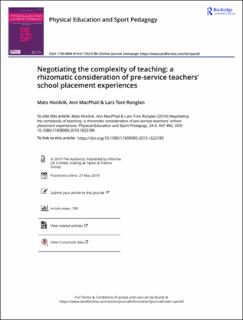| dc.contributor.author | Hordvik, Mats Melvold | |
| dc.contributor.author | MacPhail, Ann | |
| dc.contributor.author | Ronglan, Lars Tore | |
| dc.date.accessioned | 2020-03-18T17:12:38Z | |
| dc.date.available | 2020-03-18T17:12:38Z | |
| dc.date.created | 2019-06-03T08:50:53Z | |
| dc.date.issued | 2019 | |
| dc.identifier.citation | Physical Education and Sport Pedagogy. 2019, 24(5), 447-462. | en_US |
| dc.identifier.issn | 1740-8989 | |
| dc.identifier.uri | https://hdl.handle.net/11250/2647444 | |
| dc.description | This is an Open Access article distributed under the terms of the Creative Commons Attribution-NonCommercial-NoDerivatives License (http://creativecommons.org/licenses/by-nc-nd/4.0/), which permits non-commercial re-use, distribution, and reproduction in any medium, provided the original work is properly cited, and is not altered, transformed, or built upon in any way. | en_US |
| dc.description.abstract | Background and purpose: Acknowledging that it is critical that researchers design and implement studies that examine teaching as a complex phenomenon (Strom and Martin [2017]. Becoming-teacher: A Rhizomatic Look at First-year Teaching. Rotterdam: Sense Publishers), the objective of this study was to examine pre-service teachers’ (PSTs’) experience of teaching a specific content (i.e. Sport Education) in various school contexts (i.e. diverse PSTs, contexts, students, and the SE model). Using the rhizomatic (Deleuze and Guattari [1987]. A Thousand Plateaus: Capitalism and Schizophrenia. Minneapolis: University of Minnesota Press) concept of assemblage, this study was guided by the question, ‘How do PSTs negotiate their Sport Education physical education teacher education learning experience during school placement?’
Research setting and participants: Grounded in post-qualitative methodology, this study involved twenty-one PSTs undertaking their school placement as part of a three-year physical education teacher education (PETE) programme in Norway. School placement was composed of two three-week periods in upper secondary school in which the PSTs taught SE to the same class each week. The PSTs participated in a university SE-PETE unit prior to school placement.
Data collection and analysis: Three focus group interviews were conducted with three PST groups: (i) end of the SE-PETE unit and prior to school placement; (ii) between school placement blocks; and, (iii) end of school placement. Also, PST coursework was collected on completion of the PETE unit (completed in groups) and on completion of school placement (individual coursework). The nonlinear analysis process included data walking, rhizomatic mapping, situational analysis, and memo writing.
Findings and discussion: This study highlighted how particular characteristics of various human and non-human elements (that is, the PSTs themselves, their contexts, their students, the features of SE) influenced and shaped PSTs’ teaching and learning. Recognizing that it is not possible to be true to the myriad of elements influencing each PST, we provide a detailed consideration of two selected PSTs and show how interactions between human and non-human elements created two different teaching practices and learning experiences. We discuss the concept of assemblage in relation to the findings and introduce the notion of ‘translating’. In ‘translating’, as highlighted by the PSTs in this study, PSTs make sense of their PETE learning within a specific setting and a set of circumstances.
Conclusion: We contend that non-linear conceptual and methodologic frameworks, such as those featured in this study, can assist the PETE community to push beyond linear and simple ways of studying practice and instead encourage more complex conceptualizations of teaching and learning. Hence, we advocate for an ontological turn (Lather and St. Pierre [2013]. “Post-qualitative Research.” International Journal of Qualitative Studies in Education 26 (6): 629–633) in PETE research that focuses on the processes of teaching and learning rather than the outcomes alone. | en_US |
| dc.language.iso | eng | en_US |
| dc.subject | Deleuze | en_US |
| dc.subject | models-based practice | en_US |
| dc.subject | physical education teacher education | en_US |
| dc.subject | qualitative research | en_US |
| dc.subject | sport education | en_US |
| dc.title | Negotiating the complexity of teaching: A rhizomatic consideration of pre-service teachers’ school placement experiences | en_US |
| dc.type | Peer reviewed | en_US |
| dc.type | Journal article | en_US |
| dc.description.version | publishedVersion | en_US |
| dc.rights.holder | © 2019 The Author(s) | en_US |
| dc.source.pagenumber | 447-462 | en_US |
| dc.source.volume | 24 | en_US |
| dc.source.journal | Physical Education and Sport Pedagogy | en_US |
| dc.source.issue | 5 | en_US |
| dc.identifier.doi | 10.1080/17408989.2019.1623189 | |
| dc.identifier.cristin | 1702163 | |
| dc.description.localcode | Seksjon for kroppsøving og pedagogikk / Department of Physical Education | en_US |
| cristin.unitcode | 150,35,0,0 | |
| cristin.unitcode | 150,32,0,0 | |
| cristin.unitname | Seksjon for kroppsøving og pedagogikk | |
| cristin.unitname | Seksjon for coaching og psykologi | |
| cristin.ispublished | true | |
| cristin.fulltext | original | |
| cristin.qualitycode | 1 | |
